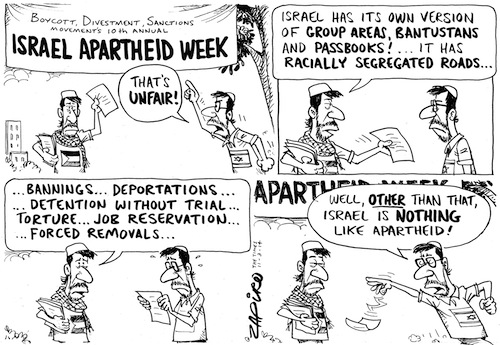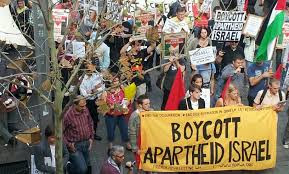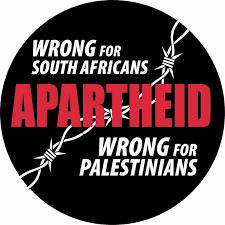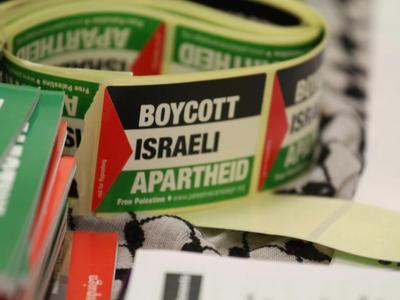Yet
in Israel ‘Apartheid’ is a term regularly used even by
Zionists
in Israel ‘Apartheid’ is a term regularly used even by
Zionists
Below is an article by Richard Kuper of Free
Speech on Israel/JfJP on how the term ‘Apartheid’ is regularly used in Israel to
describe the relations between Israeli Palestinians and Jews. Yet in Britain propaganda groups, like the Jewish
Labour Movement regularly accuse those who describe Israel as an apartheid
state of ‘anti-Semitism’.
Speech on Israel/JfJP on how the term ‘Apartheid’ is regularly used in Israel to
describe the relations between Israeli Palestinians and Jews. Yet in Britain propaganda groups, like the Jewish
Labour Movement regularly accuse those who describe Israel as an apartheid
state of ‘anti-Semitism’.
Tony Greenstein
RICHARD KUPER 2 May 2017
The
attempt to outlaw the use of the term “apartheid” in relation to
Israel and its occupation has to be recognised as carrying dangers of
effectively stifling debate on an issue of great importance
The
attempt to outlaw the use of the term “apartheid” in relation to
Israel and its occupation has to be recognised as carrying dangers of
effectively stifling debate on an issue of great importance
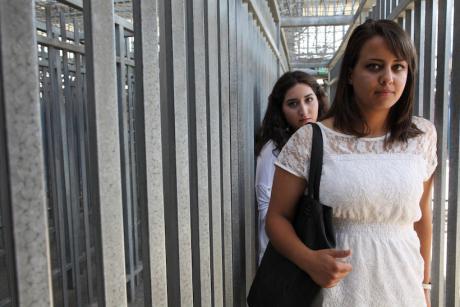 |
| Two students from occupied East Jerusalem passing daily through Qalandia checkpoint to reach Birzeit University, 2014. Credit: Rich Wiles. |
We are
faced with an increasing onslaught on criticism of Israel with attempts being
made to drawn the lines ever more narrowly. There are accusations that
any singling out of Israel is antisemitic: so, for example, calling for
boycott, divestment and sanctions in Israel’s case but not in others is prima
facie evidence of antisemitism, as is using the word apartheid to characterise
any aspect of Israeli society.
What I
would like to address here is the use of the concept of ‘apartheid’ to compare
South African and Israeli society, and the dangerous suppression involved in
outlawing its use. Critics say the analogy is plain wrong and therefore its use
can only be malign: an attempt to delegitimate, demonise and apply double
standards (to use Sharansky’s 3-D test of criticism of Israel – see the
discussion Is criticism of Israel antisemitic?) about what it is that goes beyond what is
acceptable. Ultimately, for many of these critics, the use of the term
“apartheid” is antisemitic.
would like to address here is the use of the concept of ‘apartheid’ to compare
South African and Israeli society, and the dangerous suppression involved in
outlawing its use. Critics say the analogy is plain wrong and therefore its use
can only be malign: an attempt to delegitimate, demonise and apply double
standards (to use Sharansky’s 3-D test of criticism of Israel – see the
discussion Is criticism of Israel antisemitic?) about what it is that goes beyond what is
acceptable. Ultimately, for many of these critics, the use of the term
“apartheid” is antisemitic.
Those who
argue for applying the term to Israel generally acknowledge the differences in
the South African case but argue that a wider definition of apartheid,
enshrined in the International Convention on the Suppression and
Punishment of the Crime of Apartheid, UN General Assembly Resolution 3068, 30 Nov 1973,
covers the Israeli case as well. Ben White’s book Israeli Apartheid: A beginner’s Guide (Pluto 2009) provides a
good presentation of the argument.
argue for applying the term to Israel generally acknowledge the differences in
the South African case but argue that a wider definition of apartheid,
enshrined in the International Convention on the Suppression and
Punishment of the Crime of Apartheid, UN General Assembly Resolution 3068, 30 Nov 1973,
covers the Israeli case as well. Ben White’s book Israeli Apartheid: A beginner’s Guide (Pluto 2009) provides a
good presentation of the argument.
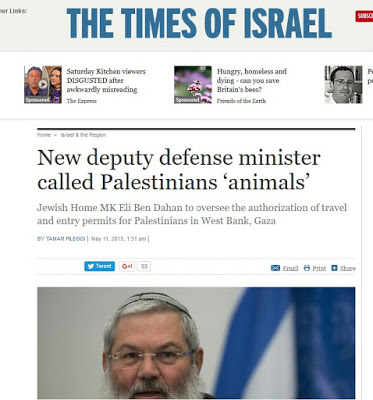 |
| The deeply ingrained racism of Israel’s government ministers |
There
have been a host of articles of the “I grew up in South
Africa, so believe me when I say: Israel is not an apartheid state” type.
Equally, other important South African voices have been prominent in drawing
analogies between living under the two regimes. In particular, it is experience
at the checkpoints that has led South Africans to say that it is “worse than
apartheid”. For in South Africa, while non-whites had to carry passes, there
was generally freedom of movement in the sense that you could go anywhere unless
and until you
were called on to produce your pass. Control in general was by post hoc police
raid, in a general search for “illegal” migrants in urban areas where they were
not supposed to be. Control over movement within Palestine and between
Palestine and Israel is far more rigorous and rigidly totalitarian on a daily
basis than it ever was under South African apartheid.
have been a host of articles of the “I grew up in South
Africa, so believe me when I say: Israel is not an apartheid state” type.
Equally, other important South African voices have been prominent in drawing
analogies between living under the two regimes. In particular, it is experience
at the checkpoints that has led South Africans to say that it is “worse than
apartheid”. For in South Africa, while non-whites had to carry passes, there
was generally freedom of movement in the sense that you could go anywhere unless
and until you
were called on to produce your pass. Control in general was by post hoc police
raid, in a general search for “illegal” migrants in urban areas where they were
not supposed to be. Control over movement within Palestine and between
Palestine and Israel is far more rigorous and rigidly totalitarian on a daily
basis than it ever was under South African apartheid.
But the
attempt to exclude the use of the term is quite widespread and Israel Apartheid
Week arouses intense opposition. Let Baroness Deech and Riverside Labour MP
Louise Ellman, Honorary President of the JLM (Jewish Labour Movement,
stand for all critics. In March 2017 Deech tweeted:
attempt to exclude the use of the term is quite widespread and Israel Apartheid
Week arouses intense opposition. Let Baroness Deech and Riverside Labour MP
Louise Ellman, Honorary President of the JLM (Jewish Labour Movement,
stand for all critics. In March 2017 Deech tweeted:
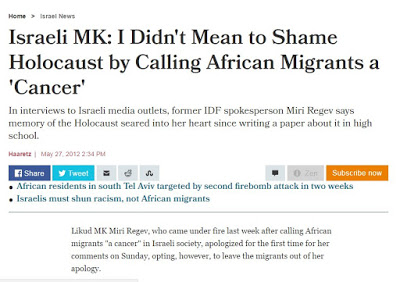 |
| Miri Regev is now ‘Culture’ Minister in Israel’s government |
“#israelapartheidweek A week of antisemitic hate, no foundation; shame on
universities that host it”; the previous year Ellman declared herself
“deeply disturbed by the news that Oxford University Labour Club has
decided to support Israeli Apartheid Week…” and regarded comparisons
between Israel and apartheid-era South Africa as “a grotesque smear”.
universities that host it”; the previous year Ellman declared herself
“deeply disturbed by the news that Oxford University Labour Club has
decided to support Israeli Apartheid Week…” and regarded comparisons
between Israel and apartheid-era South Africa as “a grotesque smear”.
I do not
want to argue the case for or against the applicability or the usefulness of
the concept in relation to our understanding of Israeli society here. (The
argument can be made well or badly and I would recommend the writings of
Israeli academic Ran Greenstein who lives and works in South Africa for a comprehensive
overview. See, for example, his two concise articles in +972 arguing a) that
it is a form of apartheid; but b) different in important respects from historical apartheid
in South Africa. )
want to argue the case for or against the applicability or the usefulness of
the concept in relation to our understanding of Israeli society here. (The
argument can be made well or badly and I would recommend the writings of
Israeli academic Ran Greenstein who lives and works in South Africa for a comprehensive
overview. See, for example, his two concise articles in +972 arguing a) that
it is a form of apartheid; but b) different in important respects from historical apartheid
in South Africa. )
Here I am
more concerned about recognising that the attempt to outlaw its use carries
real dangers of effectively stifling debate on an important issue – and
possibly devaluing the term “antisemitism” in the process.
more concerned about recognising that the attempt to outlaw its use carries
real dangers of effectively stifling debate on an important issue – and
possibly devaluing the term “antisemitism” in the process.
Reaffirming
the right to criticise Israel robustly has become increasingly urgent in the
light of the British government having ‘adopted’ the International Holocaust
Remembrance Association definition of antisemitism in December 2016. This
includes illustrative examples of what might “taking into account the overall
context” be antisemitic, with no fewer than 7 or the 11 examples relating in
some way to criticisms of Israel, for example “claiming that the existence of a State of Israel is a racist endeavor”, or “applying double
standards [to Israel] by requiring of it a behavior not expected or demanded of
any other democratic nation”. Some of the
dangers are spelt out in an opinion by Hugh Tomlinson QC (see “Legal opinion blasts
holes in pro-Israel definition of anti-Semitism”) and by former Justice
Stephen Sedley in “Defining Anti-Semitism”
the right to criticise Israel robustly has become increasingly urgent in the
light of the British government having ‘adopted’ the International Holocaust
Remembrance Association definition of antisemitism in December 2016. This
includes illustrative examples of what might “taking into account the overall
context” be antisemitic, with no fewer than 7 or the 11 examples relating in
some way to criticisms of Israel, for example “claiming that the existence of a State of Israel is a racist endeavor”, or “applying double
standards [to Israel] by requiring of it a behavior not expected or demanded of
any other democratic nation”. Some of the
dangers are spelt out in an opinion by Hugh Tomlinson QC (see “Legal opinion blasts
holes in pro-Israel definition of anti-Semitism”) and by former Justice
Stephen Sedley in “Defining Anti-Semitism”
There is
a concerted campaign to close down certain discussions and the use of terms
like apartheid is increasingly likely to lead to campaigns of intimidation
against universities, churches and others for daring to host discussion on
these topics.
a concerted campaign to close down certain discussions and the use of terms
like apartheid is increasingly likely to lead to campaigns of intimidation
against universities, churches and others for daring to host discussion on
these topics.
The Israel debate
What
critics fail to register is how widespread the use of the term “apartheid” has
become within Israel itself, either as a description of the
dire realities of today, or as a warning of where the occupation can and must
lead. Much of this appears in the pages of the liberal daily newspaper
Ha’aretz, where criticism of the Israeli regime is most openly expressed, but
the use of the term is also found in other, sometimes surprising, places.
critics fail to register is how widespread the use of the term “apartheid” has
become within Israel itself, either as a description of the
dire realities of today, or as a warning of where the occupation can and must
lead. Much of this appears in the pages of the liberal daily newspaper
Ha’aretz, where criticism of the Israeli regime is most openly expressed, but
the use of the term is also found in other, sometimes surprising, places.
Here, for
instance, is a very recent Ha’aretz editorial “Fear at the top in Israel”, 30 Mar 2017, in which the standfirst reads:
instance, is a very recent Ha’aretz editorial “Fear at the top in Israel”, 30 Mar 2017, in which the standfirst reads:
Netanyahu
and several of his ministers seem afraid above all of their image in the mirror
– of leaders of a state calling itself a democracy and practicing apartheid.
and several of his ministers seem afraid above all of their image in the mirror
– of leaders of a state calling itself a democracy and practicing apartheid.
And here
is the proprietor of Ha’aretz, the redoubtable and much respected Amos Schocken
arguing that “Only international pressure will end Israeli apartheid “, 22 Jan 2016:
is the proprietor of Ha’aretz, the redoubtable and much respected Amos Schocken
arguing that “Only international pressure will end Israeli apartheid “, 22 Jan 2016:
the most
basic democratic values of equality before the law for all people under Israel
control, and equal rights to vote and be elected, do not exist… The nearly 50
years of Israeli apartheid… The growing delegitimization of Israel is this
country’s own handiwork. Should Israel decide to end apartheid, it will return
to being legitimate in every respect.
basic democratic values of equality before the law for all people under Israel
control, and equal rights to vote and be elected, do not exist… The nearly 50
years of Israeli apartheid… The growing delegitimization of Israel is this
country’s own handiwork. Should Israel decide to end apartheid, it will return
to being legitimate in every respect.
Or again,
senior editor Bradley Burston, who “made aliyah” (immigrated) from Los Angeles
to Israel in 1976, declared in “It’s Time to Admit It. Israeli Policy
Is What It Is: Apartheid”, 17 Aug 2015): “I used to be one of those
people who took issue with the label of apartheid as applied to Israel. Not
anymore.”
senior editor Bradley Burston, who “made aliyah” (immigrated) from Los Angeles
to Israel in 1976, declared in “It’s Time to Admit It. Israeli Policy
Is What It Is: Apartheid”, 17 Aug 2015): “I used to be one of those
people who took issue with the label of apartheid as applied to Israel. Not
anymore.”
Back in
2011, former Israeli ambassador to South Africa 1992-94, Alon Liel, in saying
that “Israel needs ‘outside interference’” was arguing that “Legislation about
to be voted on in the Knesset is strikingly similar to that from Apartheid
South Africa.”
2011, former Israeli ambassador to South Africa 1992-94, Alon Liel, in saying
that “Israel needs ‘outside interference’” was arguing that “Legislation about
to be voted on in the Knesset is strikingly similar to that from Apartheid
South Africa.”
In March
2017, comedian Assaf Harel in his TV programme, “Good Night With Asaf
Harel” [broadcast on Israeli TV Channel 10] castigated Israelis for
ignoring the occupation and claimed that Israel is an apartheid state. Ha’aretz’s report was
headlined “In Last Monologue, Israeli Comedy Show Host Implores Israelis
to Wake Up and Smell the Apartheid [italics added]”, 3 Mar 2017.
2017, comedian Assaf Harel in his TV programme, “Good Night With Asaf
Harel” [broadcast on Israeli TV Channel 10] castigated Israelis for
ignoring the occupation and claimed that Israel is an apartheid state. Ha’aretz’s report was
headlined “In Last Monologue, Israeli Comedy Show Host Implores Israelis
to Wake Up and Smell the Apartheid [italics added]”, 3 Mar 2017.
Israel’s President Reuven Rivlin has recently also
got into the act with his strong opposition to the so-called “Regularization
Law”, which enables Israel to expropriate private Palestinian land where
settlements have been built. This law, he affirmed in
a meeting in February 2017, only two days after it had been passed, could
“cause Israel to look like an apartheid state”, 12 Feb 2017.
got into the act with his strong opposition to the so-called “Regularization
Law”, which enables Israel to expropriate private Palestinian land where
settlements have been built. This law, he affirmed in
a meeting in February 2017, only two days after it had been passed, could
“cause Israel to look like an apartheid state”, 12 Feb 2017.
Professor
Oren Yiftachel who has written extensively about Israeli society as an
ethnocracy, has now sharpened his critique. In “Call Apartheid in Israel by Its Name”, 11 Feb 2016, he wrote:
Oren Yiftachel who has written extensively about Israeli society as an
ethnocracy, has now sharpened his critique. In “Call Apartheid in Israel by Its Name”, 11 Feb 2016, he wrote:
Citizenship
here is reminiscent of South Africa’s in the past: Jews are ‘white’ citizens,
Arabs in Israel have ‘colored’ (in other words, partial) citizenship; and
Palestinians in the territories have ‘black’ citizenship, without political
rights.
here is reminiscent of South Africa’s in the past: Jews are ‘white’ citizens,
Arabs in Israel have ‘colored’ (in other words, partial) citizenship; and
Palestinians in the territories have ‘black’ citizenship, without political
rights.
Yossi
Sarid environment minister under Yitzhak Rabin and Shimon Peres, wrote a decade ago, 25 April 2008:
Sarid environment minister under Yitzhak Rabin and Shimon Peres, wrote a decade ago, 25 April 2008:
[T]he
white Afrikaners, too, had reasons for their segregation policy; they, too,
felt threatened – a great evil was at their door, and they were
frightened, out to defend themselves. Unfortunately, however, all good reasons
for apartheid are bad reasons; apartheid always has a reason, and it never has
a justification. And what acts like apartheid, is run like apartheid and
harasses like apartheid, is not a duck—it is apartheid.
white Afrikaners, too, had reasons for their segregation policy; they, too,
felt threatened – a great evil was at their door, and they were
frightened, out to defend themselves. Unfortunately, however, all good reasons
for apartheid are bad reasons; apartheid always has a reason, and it never has
a justification. And what acts like apartheid, is run like apartheid and
harasses like apartheid, is not a duck—it is apartheid.
Former
Israeli Attorney-General (1993–1996) Michael Ben-Yair, was already on record as saying in 2002: “In effect, we established an apartheid regime in the
occupied territories immediately following their capture. That oppressive
regime exists to this day.” 3 March 2002. He reaffirmed this opinion in an appeal to the EU to endorse the creation of
a Palestinian state and said that “Israel has imposed an “apartheid regime” on
Palestinians in the West Bank” and that “the settlement movement is a political
act by a state against another people and as such is the most evil and immoral
act since the end of World War II.” 23 Nov. 2014.
Israeli Attorney-General (1993–1996) Michael Ben-Yair, was already on record as saying in 2002: “In effect, we established an apartheid regime in the
occupied territories immediately following their capture. That oppressive
regime exists to this day.” 3 March 2002. He reaffirmed this opinion in an appeal to the EU to endorse the creation of
a Palestinian state and said that “Israel has imposed an “apartheid regime” on
Palestinians in the West Bank” and that “the settlement movement is a political
act by a state against another people and as such is the most evil and immoral
act since the end of World War II.” 23 Nov. 2014.
Shulamit Aloni, Minister of Education under Yitzhak Rabin, wrote an article in Yediot
Ahronoth, English translation, 10 Jan 2007, called “Indeed there is Apartheid in Israel”:
Ahronoth, English translation, 10 Jan 2007, called “Indeed there is Apartheid in Israel”:
[She
elaborated] Jewish self-righteousness is taken for granted among ourselves to
such an extent that we fail to see what’s right in front of our eyes. It’s
simply inconceivable that the ultimate victims, the Jews, can carry out evil
deeds. Nevertheless, the state of Israel practises its own, quite violent, form
of Apartheid with the native Palestinian population. The US Jewish Establishment’s
onslaught on former President Jimmy Carter is based on him daring to tell the
truth which is known to all: through its army, the government of Israel
practises a brutal form of Apartheid in the territory it occupies.
elaborated] Jewish self-righteousness is taken for granted among ourselves to
such an extent that we fail to see what’s right in front of our eyes. It’s
simply inconceivable that the ultimate victims, the Jews, can carry out evil
deeds. Nevertheless, the state of Israel practises its own, quite violent, form
of Apartheid with the native Palestinian population. The US Jewish Establishment’s
onslaught on former President Jimmy Carter is based on him daring to tell the
truth which is known to all: through its army, the government of Israel
practises a brutal form of Apartheid in the territory it occupies.
Respected
NGO B’tselem, The Israeli Information Center for Human Rights in the Occupied
Territories, has long used the concept of apartheid in its various reports.
NGO B’tselem, The Israeli Information Center for Human Rights in the Occupied
Territories, has long used the concept of apartheid in its various reports.
Israel
has created in the Occupied Territories a regime of separation based on
discrimination, applying two separate systems of law in the same area and
basing the rights of individuals on their nationality. This regime is the only
one of its kind in the world, and is reminiscent of distasteful regimes from
the past, such as the Apartheid regime in South Africa.
has created in the Occupied Territories a regime of separation based on
discrimination, applying two separate systems of law in the same area and
basing the rights of individuals on their nationality. This regime is the only
one of its kind in the world, and is reminiscent of distasteful regimes from
the past, such as the Apartheid regime in South Africa.
Subsequent
reports have only accumulated evidence that strengthens that conclusion.
reports have only accumulated evidence that strengthens that conclusion.
Danny
Rubinstein, a columnist for Ha’aretz likened Israel to apartheid South
Africa during a United Nations conference at the European Parliament in Brussels on 30 August
2007. A UN report records his saying that “Israel today was an apartheid State with four different
Palestinian groups: those in Gaza, East Jerusalem, the West Bank and Israeli
Palestinians, each of which had a different status.”
Rubinstein, a columnist for Ha’aretz likened Israel to apartheid South
Africa during a United Nations conference at the European Parliament in Brussels on 30 August
2007. A UN report records his saying that “Israel today was an apartheid State with four different
Palestinian groups: those in Gaza, East Jerusalem, the West Bank and Israeli
Palestinians, each of which had a different status.”
Here is
yet another Ha’aretz editorial in October 2014, following the
ruling by Defense Minister Moshe Ya’alon barring Palestinian workers from using
Israeli public transport. Under the heading “Welcome aboard Israel’s apartheid bus” 27 October 2014, he wrote:
yet another Ha’aretz editorial in October 2014, following the
ruling by Defense Minister Moshe Ya’alon barring Palestinian workers from using
Israeli public transport. Under the heading “Welcome aboard Israel’s apartheid bus” 27 October 2014, he wrote:
The
minister’s decision reeks of apartheid, typical of the Israeli occupation
regime in the territories. One of the most blatant symbols of the regime of
racial separation in South Africa was the separate bus lines for whites and
blacks. Now, Ya’alon has implemented the same policy in the occupied
territories. In so doing, he justifies the claims of those who brand Israel internationally
as an apartheid state.
minister’s decision reeks of apartheid, typical of the Israeli occupation
regime in the territories. One of the most blatant symbols of the regime of
racial separation in South Africa was the separate bus lines for whites and
blacks. Now, Ya’alon has implemented the same policy in the occupied
territories. In so doing, he justifies the claims of those who brand Israel internationally
as an apartheid state.
In yet
another example, Professor Daniel Blatman of the Hebrew University, writing in
“Heading Toward an Israeli Apartheid
State”, 4 Apr 2011, drew the connection between what was
happening in the occupied territories and what was happening in green-line
Israel:
another example, Professor Daniel Blatman of the Hebrew University, writing in
“Heading Toward an Israeli Apartheid
State”, 4 Apr 2011, drew the connection between what was
happening in the occupied territories and what was happening in green-line
Israel:
Israeli
racism, whose natural ‘hothouse’ is the colonialist project in the territories,
has long since spilled over into Israeli society and has been legitimized in
the series of laws recently passed in the Knesset.
racism, whose natural ‘hothouse’ is the colonialist project in the territories,
has long since spilled over into Israeli society and has been legitimized in
the series of laws recently passed in the Knesset.
[And
further] I believe… the aim of this legislation is the gradual establishment of
an apartheid state in Israel, and the future separation on a racial basis of
Jews and non-Jews.
further] I believe… the aim of this legislation is the gradual establishment of
an apartheid state in Israel, and the future separation on a racial basis of
Jews and non-Jews.
To round
out this brief survey of an ongoing historic debate, I would like to cite two
former Prime Ministers of Israel, both issuing dire warnings as to where Israel
was headed should it not end the occupation of the Palestinian territories.
out this brief survey of an ongoing historic debate, I would like to cite two
former Prime Ministers of Israel, both issuing dire warnings as to where Israel
was headed should it not end the occupation of the Palestinian territories.
First
Yitzhak Rabin’s warning of the dangers of apartheid reported in the Times of Israel, 25 Sep 2015, warning of the danger of
apartheid:
Yitzhak Rabin’s warning of the dangers of apartheid reported in the Times of Israel, 25 Sep 2015, warning of the danger of
apartheid:
“In
a previously unpublicized recording of a 1976 interview, Israel’s fifth prime
minister Yitzhak Rabin can be heard calling the still-nascent West Bank
settlement movement “comparable to a cancer,” and warning that Israel risked
becoming an “apartheid” state if it annexed and absorbed the West Bank’s Arab
population.”
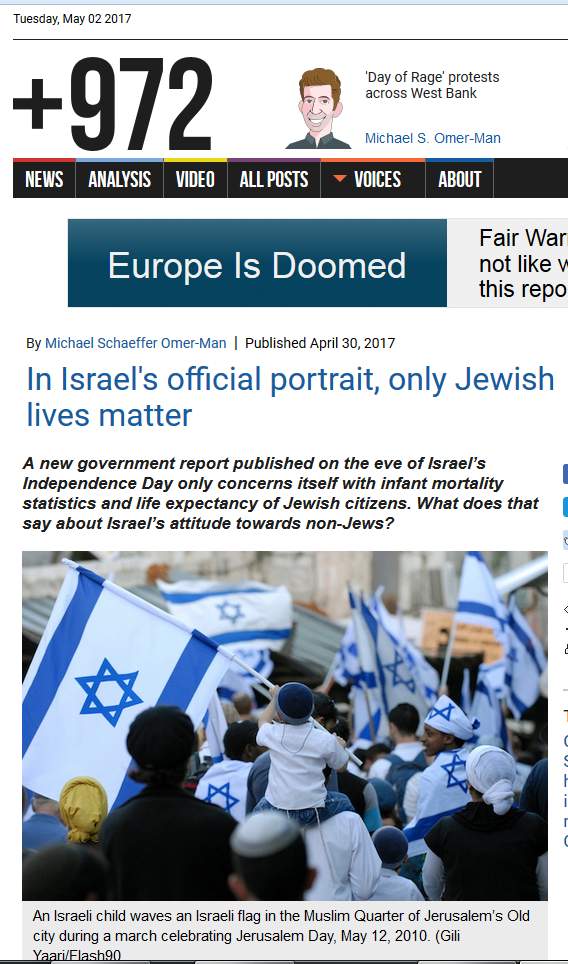 And
Andfinally, David Ben-Gurion himself. The renowned Israeli journalist Hirsh
Goodman, who had left South Africa for Israel because of the former’s
antisemitism and racism, after marching victoriously through the Sinai as a
paratrooper in the Six-Day War, recalls in his memoirs Let Me
Create a Paradise, hearing
David Ben-Gurion on the radio warning that Israel must rid itself of its Arab
territories lest it “become an Apartheid state”…
Posted in Blog
